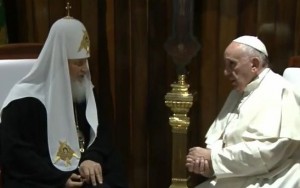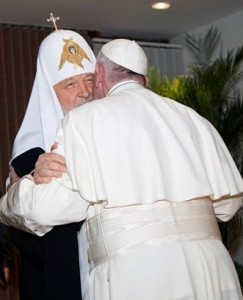Religion
John Paul II key figure of 20th century.
18 May 2020Monday marked exactly 100 years since Polish cardinal Karol Wojtyła, who in 1978 became Pope John Paul II, was born in the southern Polish town of Wadowice.
In a special message to mark the anniversary, President Andrzej Duda said that John Paul II, who led the Roman Catholic Church until his death in 2005 and was declared a saint in 2014, was a “defender of fundamental moral values and the Christian identity of Europe.”
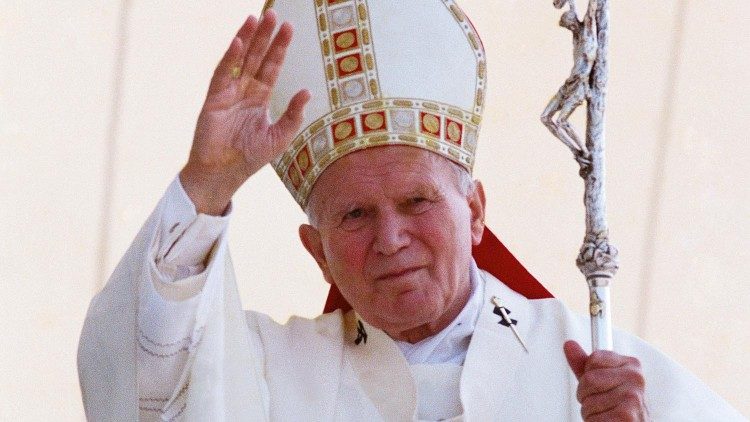
The Polish-born pope “built bridges in a world troubled by divisions and conflicts,” Duda also said.
He added that John Paul II’s “teachings and testimony still touch the hearts and minds of millions of people around the world, providing an inspiration for many religious, social, scientific and cultural initiatives.”
Duda also said in his message that Karol Wojtyła was a man of deep faith who “looked ahead with hope into the future of Poland, Europe and the world.”
While “shaping this future, we will always remember the greatest among us—the pope of freedom and solidarity,” Duda said.
Source: Polish Radio
Mondo Ortodosso: Kiev e Mosca si dividono.
12 Oct 2018Costantinopoli ha iniziato la procedura per la definitiva concessione dell’autocefalia, ossia dell’indipendenza, alla Chiesa di Kiev da quella russa. Il Santo Sinodo della Chiesa di Costantinopoli, che ha competenza sulle vertenze tra ortodossi, ha definito nulla la sua precedente decisione di 332 anni fa di concedere al Patriarcato di Mosca la giurisdizione sulle parrocchie ucraine della metropolia di Kiev. Contemporaneamente ha tolto valore all’anatema contro il capo della Chiesa ucraina Filarete, imposto dai russi. 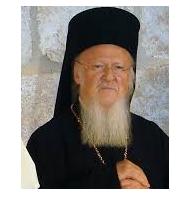
La strada verso l’autocefalia, ossia l’indipendenza, è pertanto spianata e “verrà conclusa al momento opportuno”, si legge in un comunicato.
“Questa decisione è catastrofica”, commentano fonti del Patriarcato di Mosca che contesta il diritto di Costantinopoli ad assumere tali scelte.
A Kiev, al contrario, vi è euforia. Il presidente ucraino Poroshenko vede realizzarsi la separazione dalla Russia anche in campo religioso dopo quella politica con l’EuroMajdan pro-occidentale del 2013.
La procedura per la concessione dell’autocefalia era stata iniziata da Filarete nel novembre ‘91, poco prima dello scioglimento dell’Urss, e sta giungendo a compimento dopo 27 anni.
gda
The Pope coming back from Armenia.
27 Jun 2016Pope Francis spoke on the Armenian genocide and Britain’s vote to leave the European Union, as well as a host of other topics in a wide-ranging press conference on his flight back to Rome following his Apostolic Voyage to Armenia.
Sunday’s in-flight press conference began with questions about the Apostolic Voyage to Armenia that Pope Francis had just concluded.
Asked about his message for Armenia for the future, the Holy Father spoke about his hopes and prayers for justice and peace, and his encouragement that leaders are working to that end. In particular, he talked of the work of reconciliation with Turkey and with Azerbaijan. The Pope will be travelling to Azerbaijani later this year. 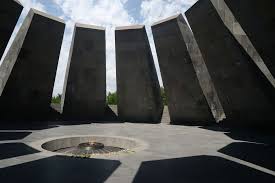
Pope Francis also spoke about his use of the word ‘genocide,’ acknowledging the legal import of the expression, but explaining that this was the term commonly in use in Argentina for the massacre of Armenians during the first World War.
About the Pan-Orthodox Council, which concluded Sunday in Crete, the Pope said, “A step was made forward . . . I think the result was positive.” In response to a question about upcoming commemorations of the 500th anniversary of the Protestant “Reformation,” Pope Francis said, “I think perhaps this is also the right moment for us not only to remember the wounds on both sides, but also to recognize the gifts of the Reformation.” He also had words of praise for Martin Luther. The Pope praying and working together are important for fostering unity.
Reporters also questioned the Pope about recent events, including the recent “Brexit” vote in Britain. He said he had not had time to study the reasons for the British vote to leave the European Union, but noted that the vote showed “divisions,” which could also be seen in other countries. “Fraternity is better, and bridges are better than walls,” he said, but he acknowledged that there are “different ways of unity.” Creativity and fruitfulness are two key words for the European Union as it faces new challenges.
Finally, answering a question from Father Federico Lombardi, SJ, the Director of the Holy See Press Office, Pope Francis reflected on his visit to the Memorial at Tzitzernakaberd, and his upcoming journey to Poland, which will include a visit to Auschwitz. The Pope said that in such places, he likes to reflect silently, “alone,” praying that the Lord might grant him “the grace of crying.”
Extract from the Vatican Radio.
Dichiarazione comune firmata all’Avana da Papa Francesco e il Patriarca Kirill:
- Per volontà di Dio Padre dal quale viene ogni dono, nel nome del Signore nostro Gesù Cristo, e con l’aiuto dello Spirito Santo Consolatore, noi, Papa Francesco e Kirill, Patriarca di Mosca e di tutta la Russia, ci siamo incontrati oggi a L’Avana. Rendiamo grazie a Dio, glorificato nella Trinità, per questo incontro, il primo nella storia. Con gioia ci siamo ritrovati come fratelli nella fede cristiana che si incontrano per «parlare a viva voce» (2 Gv 12), da cuore a cuore, e discutere dei rapporti reciproci tra le Chiese, dei problemi essenziali dei nostri fedeli e delle prospettive di sviluppo della civiltà umana.
- Il nostro incontro fraterno ha avuto luogo a Cuba, all’incrocio tra Nord e Sud, tra Est e Ovest. Da questa isola, simbolo delle speranze del “Nuovo Mondo” e degli eventi drammatici della storia del XX secolo, rivolgiamo la nostra parola a tutti i popoli dell’America Latina e degli altri Continenti. Ci rallegriamo che la fede cristiana stia crescendo qui in modo dinamico. Il potente potenziale religioso dell’America Latina, la sua secolare tradizione cristiana, realizzata nell’esperienza personale di milioni di persone, sono la garanzia di un grande futuro per questa regione.
- Incontrandoci lontano dalle antiche contese del “Vecchio Mondo”, sentiamo con particolare forza la necessità di un lavoro comune tra cattolici e ortodossi, chiamati, con dolcezza e rispetto, a rendere conto al mondo della speranza che è in noi (cfr 1 Pt 3, 15).
- Rendiamo grazie a Dio per i doni ricevuti dalla venuta nel mondo del suo unico Figlio. Condividiamo la comune Tradizione spirituale del primo millennio del cristianesimo. I testimoni di questa Tradizione sono la Santissima Madre di Dio, la Vergine Maria, e i Santi che veneriamo. Tra loro ci sono innumerevoli martiri che hanno testimoniato la loro fedeltà a Cristo e sono diventati “seme di cristiani”.
- Nonostante questa Tradizione comune dei primi dieci secoli, cattolici e ortodossi, da quasi mille anni, sono privati della comunione nell’Eucaristia. Siamo divisi da ferite causate da conflitti di un passato lontano o recente, da divergenze, ereditate dai nostri antenati, nella comprensione e l’esplicitazione della nostra fede in Dio, uno in tre Persone – Padre, Figlio e Spirito Santo. Deploriamo la perdita dell’unità, conseguenza della debolezza umana e del peccato, accaduta nonostante la Preghiera sacerdotale di Cristo Salvatore: «Perché tutti siano una sola cosa. Come tu, Padre, sei in me e io in te, siano anch’essi in noi una cosa sola» (Gv 17, 21).
- Consapevoli della permanenza di numerosi ostacoli, ci auguriamo che il nostro incontro possa contribuire al ristabilimento di questa unità voluta da Dio, per la quale Cristo ha pregato. Possa il nostro incontro ispirare i cristiani di tutto il mondo a pregare il Signore con rinnovato fervore per la piena unità di tutti i suoi discepoli. In un mondo che attende da noi non solo parole ma gesti concreti, possa questo incontro essere un segno di speranza per tutti gli uomini di buona volontà!
- Nella nostra determinazione a compiere tutto ciò che è necessario per superare le divergenze storiche che abbiamo ereditato, vogliamo unire i nostri sforzi per testimoniare il Vangelo di Cristo e il patrimonio comune della Chiesa del primo millennio, rispondendo insieme alle sfide del mondo contemporaneo. Ortodossi e cattolici devono imparare a dare una concorde testimonianza alla verità in ambiti in cui questo è possibile e necessario. La civiltà umana è entrata in un periodo di cambiamento epocale. La nostra coscienza cristiana e la nostra responsabilità pastorale non ci autorizzano a restare inerti di fronte alle sfide che richiedono una risposta comune.
- Il nostro sguardo si rivolge in primo luogo verso le regioni del mondo dove i cristiani sono vittime di persecuzione. In molti paesi del Medio Oriente e del Nord Africa i nostri fratelli e sorelle in Cristo vengono sterminati per famiglie, villaggi e città intere. Le loro chiese sono devastate e saccheggiate barbaramente, i loro oggetti sacri profanati, i loro monumenti distrutti. In Siria, in Iraq e in altri paesi del Medio Oriente, constatiamo con dolore l’esodo massiccio dei cristiani dalla terra dalla quale cominciò a diffondersi la nostra fede e dove essi hanno vissuto, fin dai tempi degli apostoli, insieme ad altre comunità religiose.
- Chiediamo alla comunità internazionale di agire urgentemente per prevenire l’ulteriore espulsione dei cristiani dal Medio Oriente. Nell’elevare la voce in difesa dei cristiani perseguitati, desideriamo esprimere la nostra compassione per le sofferenze subite dai fedeli di altre tradizioni religiose diventati anch’essi vittime della guerra civile, del caos e della violenza terroristica.
- In Siria e in Iraq la violenza ha già causato migliaia di vittime, lasciando milioni di persone senza tetto né risorse. Esortiamo la comunità internazionale ad unirsi per porre fine alla violenza e al terrorismo e, nello stesso tempo, a contribuire attraverso il dialogo ad un rapido ristabilimento della pace civile. È essenziale assicurare un aiuto umanitario su larga scala alle popolazioni martoriate e ai tanti rifugiati nei paesi confinanti. Chiediamo a tutti coloro che possono influire sul destino delle persone rapite, fra cui i Metropoliti di Aleppo, Paolo e Giovanni Ibrahim, sequestrati nel mese di aprile del 2013, di fare tutto ciò che è necessario per la loro rapida liberazione.
- Eleviamo le nostre preghiere a Cristo, il Salvatore del mondo, per il ristabilimento della pace in Medio Oriente che è “il frutto della giustizia” (cfr Is 32, 17), affinché si rafforzi la convivenza fraterna tra le varie popolazioni, le Chiese e le religioni che vi sono presenti, per il ritorno dei rifugiati nelle loro case, la guarigione dei feriti e il riposo dell’anima degli innocenti uccisi. Ci rivolgiamo, con un fervido appello, a tutte le parti che possono essere coinvolte nei conflitti perché mostrino buona volontà e siedano al tavolo dei negoziati. Al contempo, è necessario che la comunità internazionale faccia ogni sforzo possibile per porre fine al terrorismo con l’aiuto di azioni comuni, congiunte e coordinate. Facciamo appello a tutti i paesi coinvolti nella lotta contro il terrorismo, affinché agiscano in maniera responsabile e prudente. Esortiamo tutti i cristiani e tutti i credenti in Dio a pregare con fervore il provvidente Creatore del mondo perché protegga il suo creato dalla distruzione e non permetta una nuova guerra mondiale. Affinché la pace sia durevole ed affidabile, sono necessari specifici sforzi volti a riscoprire i valori comuni che ci uniscono, fondati sul Vangelo di nostro Signore Gesù Cristo.
- Ci inchiniamo davanti al martirio di coloro che, a costo della propria vita, testimoniano la verità del Vangelo, preferendo la morte all’apostasia di Cristo. Crediamo che questi martiri del nostro tempo, appartenenti a varie Chiese, ma uniti da una comune sofferenza, sono un pegno dell’unità dei cristiani. È a voi, che soffrite per Cristo, che si rivolge la parola dell’apostolo: «Carissimi, … nella misura in cui partecipate alle sofferenze di Cristo, rallegratevi perché anche nella rivelazione della Sua gloria possiate rallegrarvi ed esultare» (1 Pt 4, 12-13).
- In quest’epoca inquietante, il dialogo interreligioso è indispensabile. Le differenze nella comprensione delle verità religiose non devono impedire alle persone di fedi diverse di vivere nella pace e nell’armonia. Nelle circostanze attuali, i leader religiosi hanno la responsabilità particolare di educare i loro fedeli in uno spirito rispettoso delle convinzioni di coloro che appartengono ad altre tradizioni religiose. Sono assolutamente inaccettabili i tentativi di giustificare azioni criminali con slogan religiosi. Nessun crimine può essere commesso in nome di Dio, «perché Dio non è un Dio di disordine, ma di pace» (1 Cor 14, 33).
- Nell’affermare l’alto valore della libertà religiosa, rendiamo grazie a Dio per il rinnovamento senza precedenti della fede cristiana che sta accadendo ora in Russia e in molti paesi dell’Europa orientale, dove i regimi atei hanno dominato per decenni. Oggi le catene dell’ateismo militante sono spezzate e in tanti luoghi i cristiani possono liberamente professare la loro fede. In un quarto di secolo, vi sono state costruite decine di migliaia di nuove chiese, e aperti centinaia di monasteri e scuole teologiche. Le comunità cristiane portano avanti un’importante attività caritativa e sociale, fornendo un’assistenza diversificata ai bisognosi. Ortodossi e cattolici spesso lavorano fianco a fianco. Essi attestano l’esistenza dei fondamenti spirituali comuni della convivenza umana, testimoniando i valori del Vangelo.
- Allo stesso tempo, siamo preoccupati per la situazione in tanti paesi in cui i cristiani si scontrano sempre più frequentemente con una restrizione della libertà religiosa, del diritto di testimoniare le proprie convinzioni e la possibilità di vivere conformemente ad esse. In particolare, constatiamo che la trasformazione di alcuni paesi in società secolarizzate, estranee ad ogni riferimento a Dio ed alla sua verità, costituisce una grave minaccia per la libertà religiosa. È per noi fonte di inquietudine l’attuale limitazione dei diritti dei cristiani, se non addirittura la loro discriminazione, quando alcune forze politiche, guidate dall’ideologia di un secolarismo tante volte assai aggressivo, cercano di spingerli ai margini della vita pubblica.
- Il processo di integrazione europea, iniziato dopo secoli di sanguinosi conflitti, è stato accolto da molti con speranza, come una garanzia di pace e di sicurezza. Tuttavia, invitiamo a rimanere vigili contro un’integrazione che non sarebbe rispettosa delle identità religiose. Pur rimanendo aperti al contributo di altre religioni alla nostra civiltà, siamo convinti che l’Europa debba restare fedele alle sue radici cristiane. Chiediamo ai cristiani dell’Europa orientale e occidentale di unirsi per testimoniare insieme Cristo e il Vangelo, in modo che l’Europa conservi la sua anima formata da duemila anni di tradizione cristiana.
- Il nostro sguardo si rivolge alle persone che si trovano in situazioni di grande difficoltà, che vivono in condizioni di estremo bisogno e di povertà mentre crescono le ricchezze materiali dell’umanità. Non possiamo rimanere indifferenti alla sorte di milioni di migranti e di rifugiati che bussano alla porta dei paesi ricchi. Il consumo sfrenato, come si vede in alcuni paesi più sviluppati, sta esaurendo gradualmente le risorse del nostro pianeta. La crescente disuguaglianza nella distribuzione dei beni terreni aumenta il sentimento d’ingiustizia nei confronti del sistema di relazioni internazionali che si è stabilito.
- Le Chiese cristiane sono chiamate a difendere le esigenze della giustizia, il rispetto per le tradizioni dei popoli e un’autentica solidarietà con tutti coloro che soffrono. Noi, cristiani, non dobbiamo dimenticare che «Dio ha scelto ciò che nel mondo è stolto per confondere i sapienti, Dio ha scelto ciò che nel mondo è debole per confondere i forti, Dio ha scelto ciò che nel mondo è ignobile e disprezzato e ciò che è nulla per ridurre a nulla le cose che sono, perché nessun uomo possa gloriarsi davanti a Dio» (1 Cor 1, 27-29).
- La famiglia è il centro naturale della vita umana e della società. Siamo preoccupati dalla crisi della famiglia in molti paesi. Ortodossi e cattolici condividono la stessa concezione della famiglia e sono chiamati a testimoniare che essa è un cammino di santità, che testimonia la fedeltà degli sposi nelle loro relazioni reciproche, la loro apertura alla procreazione e all’educazione dei figli, la solidarietà tra le generazioni e il rispetto per i più deboli.
- La famiglia si fonda sul matrimonio, atto libero e fedele di amore di un uomo e di una donna. È l’amore che sigilla la loro unione ed insegna loro ad accogliersi reciprocamente come dono. Il matrimonio è una scuola di amore e di fedeltà. Ci rammarichiamo che altre forme di convivenza siano ormai poste allo stesso livello di questa unione, mentre il concetto di paternità e di maternità come vocazione particolare dell’uomo e della donna nel matrimonio, santificato dalla tradizione biblica, viene estromesso dalla coscienza pubblica.
- Chiediamo a tutti di rispettare il diritto inalienabile alla vita. Milioni di bambini sono privati della possibilità stessa di nascere nel mondo. La voce del sangue di bambini non nati grida verso Dio (cfr Gen 4, 10). Lo sviluppo della cosiddetta eutanasia fa sì che le persone anziane e gli infermi inizino a sentirsi un peso eccessivo per le loro famiglie e la società in generale. Siamo anche preoccupati dallo sviluppo delle tecniche di procreazione medicalmente assistita, perché la manipolazione della vita umana è un attacco ai fondamenti dell’esistenza dell’uomo, creato ad immagine di Dio. Riteniamo che sia nostro dovere ricordare l’immutabilità dei principi morali cristiani, basati sul rispetto della dignità dell’uomo chiamato alla vita, secondo il disegno del Creatore.
- Oggi, desideriamo rivolgerci in modo particolare ai giovani cristiani. Voi, giovani, avete come compito di non nascondere il talento sotto terra (cfr Mt 25, 25), ma di utilizzare tutte le capacità che Dio vi ha dato per confermare nel mondo le verità di Cristo, per incarnare nella vostra vita i comandamenti evangelici dell’amore di Dio e del prossimo. Non abbiate paura di andare controcorrente, difendendo la verità di Dio, alla quale odierne norme secolari sono lontane dal conformarsi sempre.
- Dio vi ama e aspetta da ciascuno di voi che siate Suoi discepoli e apostoli. Siate la luce del mondo affinché coloro che vi circondano, vedendo le vostre opere buone, rendano gloria al vostro Padre che è nei cieli (cfr Mt 5, 14, 16). Educate i vostri figli nella fede cristiana, trasmettete loro la perla preziosa della fede (cfr Mt 13, 46) che avete ricevuta dai vostri genitori ed antenati. Ricordate che «siete stati comprati a caro prezzo» (1 Cor 6, 20), al costo della morte in croce dell’Uomo-Dio Gesù Cristo.
- Ortodossi e cattolici sono uniti non solo dalla comune Tradizione della Chiesa del primo millennio, ma anche dalla missione di predicare il Vangelo di Cristo nel mondo di oggi. Questa missione comporta il rispetto reciproco per i membri delle comunità cristiane ed esclude qualsiasi forma di proselitismo. Non siamo concorrenti ma fratelli, e da questo concetto devono essere guidate tutte le nostre azioni reciproche e verso il mondo esterno. Esortiamo i cattolici e gli ortodossi di tutti i paesi ad imparare a vivere insieme nella pace e nell’amore, e ad avere «gli uni verso gli altri gli stessi sentimenti» (Rm 15, 5). Non si può quindi accettare l’uso di mezzi sleali per incitare i credenti a passare da una Chiesa ad un’altra, negando la loro libertà religiosa o le loro tradizioni. Siamo chiamati a mettere in pratica il precetto dell’apostolo Paolo: «Mi sono fatto un punto di onore di non annunziare il vangelo se non dove ancora non era giunto il nome di Cristo, per non costruire su un fondamento altrui» (Rm 15, 20).
- Speriamo che il nostro incontro possa anche contribuire alla riconciliazione, là dove esistono tensioni tra greco-cattolici e ortodossi. Oggi è chiaro che il metodo dell’“uniatismo” del passato, inteso come unione di una comunità all’altra, staccandola dalla sua Chiesa, non è un modo che permette di ristabilire l’unità. Tuttavia, le comunità ecclesiali apparse in queste circostanze storiche hanno il diritto di esistere e di intraprendere tutto ciò che è necessario per soddisfare le esigenze spirituali dei loro fedeli, cercando nello stesso tempo di vivere in pace con i loro vicini. Ortodossi e greco-cattolici hanno bisogno di riconciliarsi e di trovare forme di convivenza reciprocamente accettabili.
- Deploriamo lo scontro in Ucraina che ha già causato molte vittime, innumerevoli ferite ad abitanti pacifici e gettato la società in una grave crisi economica ed umanitaria. Invitiamo tutte le parti del conflitto alla prudenza, alla solidarietà sociale e all’azione per costruire la pace. Invitiamo le nostre Chiese in Ucraina a lavorare per pervenire all’armonia sociale, ad astenersi dal partecipare allo scontro e a non sostenere un ulteriore sviluppo del conflitto.
- Auspichiamo che lo scisma tra i fedeli ortodossi in Ucraina possa essere superato sulla base delle norme canoniche esistenti, che tutti i cristiani ortodossi dell’Ucraina vivano nella pace e nell’armonia, e che le comunità cattoliche del Paese vi contribuiscano, in modo da far vedere sempre di più la nostra fratellanza cristiana.
- Nel mondo contemporaneo, multiforme eppure unito da un comune destino, cattolici e ortodossi sono chiamati a collaborare fraternamente nell’annuncio della Buona Novella della salvezza, a testimoniare insieme la dignità morale e la libertà autentica della persona, «perché il mondo creda» (Gv 17, 21). Questo mondo, in cui scompaiono progressivamente i pilastri spirituali dell’esistenza umana, aspetta da noi una forte testimonianza cristiana in tutti gli ambiti della vita personale e sociale. Dalla nostra capacità di dare insieme testimonianza dello Spirito di verità in questi tempi difficili dipende in gran parte il futuro dell’umanità.
- In questa ardita testimonianza della verità di Dio e della Buona Novella salvifica, ci sostenga l’Uomo-Dio Gesù Cristo, nostro Signore e Salvatore, che ci fortifica spiritualmente con la sua infallibile promessa: «Non temere, piccolo gregge, perché al Padre vostro è piaciuto di darvi il suo Regno» (Lc 12, 32)! Cristo è fonte di gioia e di speranza. La fede in Lui trasfigura la vita umana, la riempie di significato. Di ciò si sono potuti convincere, attraverso la loro esperienza, tutti coloro a cui si possono applicare le parole dell’apostolo Pietro: «Voi, che un tempo eravate non-popolo, ora invece siete il popolo di Dio; voi, un tempo esclusi dalla misericordia, ora invece avete ottenuto misericordia» (1 Pt 2, 10).
- Pieni di gratitudine per il dono della comprensione reciproca espresso durante il nostro incontro, guardiamo con speranza alla Santissima Madre di Dio, invocandola con le parole di questa antica preghiera: “Sotto il riparo della tua misericordia, ci rifugiamo, Santa Madre di Dio”. Che la Beata Vergine Maria, con la sua intercessione, incoraggi alla fraternità coloro che la venerano, perché siano riuniti, al tempo stabilito da Dio, nella pace e nell’armonia in un solo popolo di Dio, per la gloria della Santissima e indivisibile Trinità!
The Pope and The Patriarch together in Cuba
13 Feb 2016An historic meeting between Pope Francis and Patriarch Kirill of the Russian Orthodox Church is “getting closer every day,” Metropolitan Hilarion, the head of the Russian Orthodox Church’s foreign relations department, said in an interview.
He said the meeting between the head of the 1.2 billion member Roman Catholic Church and the head of Russian Orthodox Church – which counts some 165 million of the world’s 250 million Orthodox Christians – would take place in a “neutral” country, not in Moscow or the Vatican. Austria or Hungary were possibilities, he said.
Francis told reporters last year that he had sent word to Kirill that he was willing to meet the Russian patriarch “wherever you want, you call me and I’ll come”.
Диссидент Глеб Якунин ушел из жизни.
26 Dec 2014В Москве на 81-ом году жизни скончался бывший депутат Госдумы, правозащитник Глеб Якунин. “Отец Глеб умер после тяжелой болезни. Правозащитное сообщество скорбит”, – сказал глава движения “За права человека” Лев Пономарев.
Глеб Якунин родился 4 марта 1934 года в Москве. Окончил Иркутский сельскохозяйственный институт. По образованию – биолог. В 1958-59 годах учился в Московской духовной семинарии. 10 августа 1962 года рукоположен в сан священника в Никольский храм Зарайска. 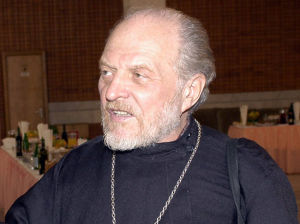
В 60-70-е годы – деятельный участник правозащитного движения.
В советское время Глеб Якунин был осужден за антисоветскую агитацию и пропаганду. Отбывал срок в Перми-37 (1979–1985 гг.), а затем два с половиной года провел в ссылке в Якутии. Участвовал в работе парламентской комиссии по расследованию причин и обстоятельств ГКЧП (1991–1992 гг.). Комиссия опубликовала в том числе и архивные материалы КГБ о сотрудничестве отдельных иерархов РПЦ с КГБ. В 1993–1995 годах — депутат Госдумы.
РПЦ дважды предавала Якунина анафеме. Первый раз — в 1966 году за письмо, направленное патриарху Алексию I, в котором описывалось подавление органами государственной власти СССР прав и свобод верующих граждан страны (восстановлен в сане в 1987 году). Второй раз — в 1997 году «за самочинное ношение иерейского креста и священнических одежд» (после лишения сана в 1993 году по причине отказа подчиняться требованию о неучастии православных клириков в парламентских выборах), а также за «общение с самозваным патриархом Киевским Филаретом».
С 1990-х годов Г.Якунин был признанным лидером Движения “Демократическая Россия” и ее сопредседателем. Являлся священнослужителем Апостольской православной церкви.
Calling Pope Francis his “beloved brother in Christ,” the head of the Orthodox Church, Ecumenical Patriarch Bartholomew I on Sunday recalled their gathering last May at the Church of the Holy Sepulcher in Jerusalem on the fiftieth anniversary of the historic ecumenical meeting of their predecessors, Pope Paul VI and Patriarch Athenagoras. 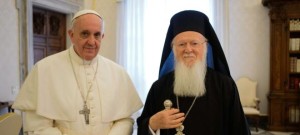
Welcoming the Pope after a celebration of the Divine Liturgy at the Patriarchal Church of St. George in Istanbul, Patriarch Bartholomew said “the path toward unity is more urgent than ever for those who invoke the name of the great Peacemaker.”
Citing the “diverse divisions, conflicts and animosities, frequently even in the name of God,” the Patriarch said Christians have a “great” responsibility “before God, humankind and history.”
He noted that the Orthodox Church is preparing for its Great Council planned for 2016 and asked Pope Francis to pray for its success. The Patriarch expressed satisfaction that members of both Churches are present as observers in each other’s synodal life and said he hoped that once full communion is restored, “the significant and special day” of holding a joint Great Ecumenical Council will “not be prolonged.”
In concluding, the Patriarch said “the challenges presented to our Churches by today’s historical circumstances oblige us to transcend our introversion in order to meet them with the greatest degree of collaboration. We no longer have the luxury of isolated action. The modern persecutors of Christians do not ask which Church their victims belong to. The unity that concerns us is regrettably already occurring in certain regions of the world through the blood of martyrdom.”
Vatican Radio – The complete text of Ecumenical Patriarch Bartholomew I’s address to Pope Francis.
Vatican Radio – Dichiarazione congiunta. Papa e Bartolomeo: no a Medio Oriente senza cristiani
Pope Francis has declared Popes John Paul II and John XXIII saints, in front of a crowd of hundreds of thousands.
He praised his two predecessors as “men of courage” at the Vatican service, the first time in history that two popes have been canonised at the same time.
The Mass was attended by about 100 foreign delegations.
The Catholic Church’s two newest saints were “popes of the twentieth century” and “were not afraid to look upon the wounds of Christ,” said Pope Francis on Sunday.
“They lived through the tragic events of that century, but they were not overwhelmed by them,” Pope Francis said in his homily. “For them, God was more powerful; faith was more powerful — faith in Jesus Christ the Redeemer of man and the Lord of history.” 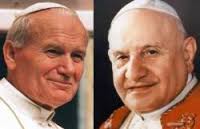
Earlier in the Mass, also attended by Pope Emeritus Benedict XVI, Pope Francis read the formal proclamation of sainthood during the canonization rite. The crowd roared with applause upon hearing their names read in Latin in the official proclamation.
Pope Francis described Saint John XXIII as “the pope of openness to the Spirit” and Saint John Paul II as “the pope of the family“, each description followed by applause.
Pope Francis also underlined the deep faith of his two predecessors: “These were two men of courage, filled with the parrhesia of the Holy Spirit, and they bore witness before the Church and the world to God’s goodness and mercy.”
The two new saints “teach us to enter ever more deeply into the mystery of divine mercy,” he concluded.
Analysts say Francis is trying to balance the conservative legacy of John Paul with the reforming zeal of John.
Source: Vatican Radio
Tenere viva nel mondo la sete dell’Assoluto. Questa l’esortazione indicata da Papa Francesco nel discorso rivolto ai rappresentanti delle Chiese e delle comunità ecclesiali, del popolo ebraico e delle varie religioni, incontrati nella Sala Clementina in Vaticano. Poco prima, il Pontefice aveva incontrato il Patriarca ortodosso ecumenico, Bartolomeo I – con cui si è intrattenuto per circa 20 minuti e che più tardi ha ringraziato come “mio fratello Andrea” – e il Metropolita Hilarion, del Patriarcato di Mosca.
Bartolomeo I e Hilarion hanno donato al Papa due icone mariane. Nell’incontro nella Sala Clementina, Papa Francesco – che ha espresso la “ferma volontà” di proseguire il cammino nel dialogo ecumenico – ha poi ricordato lo speciale vincolo spirituale con il popolo ebraico, l’importanza della cooperazione con i fedeli di altre religioni e la meta dell’unità tra i credenti in Cristo.
Papa Francesco, rivolgendosi ai delegati delle Chiese Ortodosse e delle Comunità ecclesiali d’Occidente, ha indicato una prospettiva intima e peculiare, quella tracciata dal suo sguardo proteso verso Piazza San Pietro in occasione della Messa per l’inizio del ministero petrino:
“Ho riconosciuto spiritualmente presenti le comunità che rappresentate. In questa manifestazione di fede mi è parso così di vivere in maniera ancora più pressante la preghiera per l’unità tra i credenti in Cristo e insieme di vederne in qualche modo prefigurata quella piena realizzazione, che dipende dal piano di Dio e dalla nostra leale collaborazione”.
Il Pontefice, dopo aver chiesto ai rappresentanti delle Comunità cristiane una speciale preghiera affinché “possa essere un Pastore secondo il cuore di Cristo”, ha ricordato che il migliore servizio alla causa dell’unità tra i cristiani è vivere in pienezza la fede, dando “una testimonianza libera, gioiosa e coraggiosa”.
“Più saremo fedeli alla sua volontà, nei pensieri, nelle parole e nelle opere, e più cammineremo realmente e sostanzialmente verso l’unità”.
Il Papa si è poi rivolto ai rappresentanti del popolo ebraico, al quale – ha detto – ci lega uno “specialissimo vincolo spirituale”:
“Vi ringrazio della vostra presenza e confido che con l’aiuto dell’Altissimo, potremo proseguire proficuamente quale fraterno dialogo che il Concilio auspicava e che si è effettivamente realizzato, portando non pochi frutti, specialmente nel corso degli ultimi decenni”.
Salutando i rappresentanti di altre religioni, Papa Francesco si è rivolto in particolare ai musulmani:
“Apprezzo molto la vostra presenza: in essa vedo un segno tangibile della volontà di crescere nella stima reciproca e nella cooperazione per il bene comune dell’umanità”.
La Chiesa cattolica – ha spiegato il Pontefice – è consapevole dell’importanza del dialogo interreligioso:
“La Chiesa cattolica è consapevole dell’importanza che ha la promozione dell’amicizia e del rispetto tra uomini e donne di diverse tradizioni religiose; questo voglio ripeterlo: promozione dell’amicizia e del rispetto tra uomini e donne di diverse tradizioni religiose. (…) Essa è ugualmente consapevole della responsabilità che tutti portiamo verso questo nostro mondo, verso l’intero creato, che dobbiamo amare e custodire. E noi possiamo fare molto per il bene di chi è più povero, di chi è debole e di chi soffre, per favorire la giustizia, per promuovere la riconciliazione, per costruire la pace”.
Servizio completo – Radio Vaticana – Andrea Lomonaco – 20.03.2013
Welcome
We are a group of long experienced European journalists and intellectuals interested in international politics and culture. We would like to exchange our opinion on new Europe and Russia.
Categories
- Breaking News (11)
- CIS (129)
- Climate (2)
- Energy&Economy (115)
- EU Eastern Dimension (85)
- Euro 2012 – Sochi 2014 – World Cup 2018, Sport (43)
- Euro-Integration (135)
- History Culture (198)
- International Policy (261)
- Military (74)
- Interviews (18)
- Italy – Italia – Suisse (47)
- Odd Enough (10)
- Poland and Baltic States (126)
- Religion (31)
- Russia (421)
- Survey (4)
- Turning points (4)
- Ukraine (176)
- Российские страницы (113)
Archives
- November 2020
- October 2020
- September 2020
- August 2020
- July 2020
- May 2020
- April 2020
- March 2020
- January 2020
- December 2019
- November 2019
- October 2019
- September 2019
- August 2019
- July 2019
- June 2019
- May 2019
- April 2019
- March 2019
- February 2019
- December 2018
- November 2018
- October 2018
- September 2018
- August 2018
- July 2018
- June 2018
- May 2018
- April 2018
- March 2018
- February 2018
- January 2018
- December 2017
- November 2017
- October 2017
- September 2017
- August 2017
- July 2017
- May 2017
- March 2017
- January 2017
- December 2016
- November 2016
- October 2016
- September 2016
- July 2016
- June 2016
- May 2016
- April 2016
- February 2016
- January 2016
- November 2015
- October 2015
- September 2015
- June 2015
- April 2015
- March 2015
- February 2015
- January 2015
- December 2014
- November 2014
- October 2014
- September 2014
- August 2014
- July 2014
- June 2014
- May 2014
- April 2014
- March 2014
- February 2014
- January 2014
- December 2013
- November 2013
- October 2013
- September 2013
- August 2013
- July 2013
- June 2013
- May 2013
- April 2013
- March 2013
- February 2013
- January 2013
- December 2012
- November 2012
- October 2012
- September 2012
- August 2012
- July 2012
- June 2012
- May 2012
- April 2012
- March 2012
- February 2012
- January 2012
- December 2011
- November 2011
- October 2011
- September 2011
- August 2011
- July 2011
- June 2011
- May 2011
- April 2011
- March 2011
- February 2011
- January 2011
- December 2010
- November 2010
- October 2010
- September 2010
- August 2010
- July 2010
- June 2010
- May 2010
- April 2010
- March 2010
- February 2010
- January 2010
- December 2009
- November 2009
- October 2009
- September 2009
- August 2009
Our books





